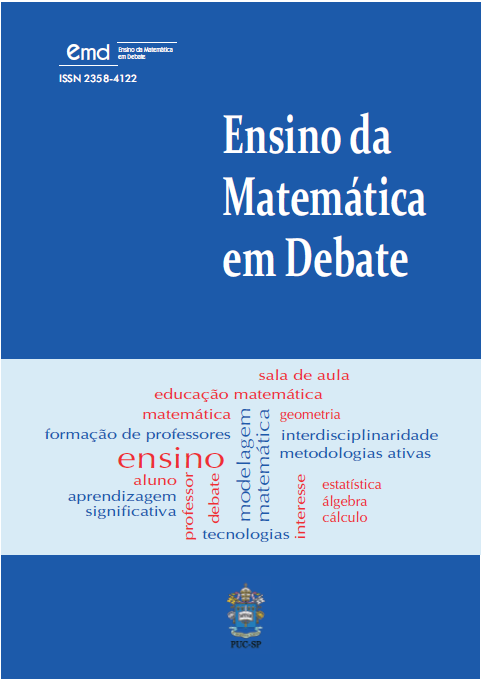ANALYSING TEACHERS’ EXPERTISE, RESOURCES AND COLLECTIVE WORK THROUGHOUT CHINESE AND FRENCH WINDOWS
Palavras-chave:
teacher professional development, teaching research group, ChinaResumo
The working culture in Mainland China has been described as collective (Yang, 2010). Learning community is claimed not only in students` learning but also in teacher professional development. As a main and key form of teacher professional learning community, Teaching Research Group (TRG) is considered as a basic non-administrative organization (Hu & Wang, 2014), which combines teaching, scientific research and daily management into an integral whole, started since 1957. In February 2014, an interview with three Chinese mathematic teachers was conducted for a preliminary study of the author`s PhD thesis aiming to compare Mathematics Teachers’ Documentation Work (Gueudet, Pepin & Trouche, 2012) in China and France, focusing on Teaching Resources of Advanced Teachers. This presentation will focus on teacher`s teaching research group based on not only the interview data, but also some academic and official documents as references.
Referências
AN, S., KULM, G. & WU, Z. The pedagogical content knowledge of middle school, mathematic teachers in China and the US. Journal of Mathematics Teacher Education, 7(2), p. 145-172, 2004.
BUISSON, F. (Ed.). Nouveau Dictionnaire de Pédagogie et d’instruction primaire. Paris: Hachette, 1911. Retreived in September 2015 at: http://www.inrp.fr/edition-electronique/lodel/dictionnaire-ferdinand-buisson/
CHEN, G. Evolvement trajectory of TRG in China. Education Management research, 4. 2006.
DING, G. National Teacher Professional Development Surveys. Shanghai: East China Normal University Press, 2010.
GUEUDET, G. & TROUCHE, L. Towards new documentation systems for mathematics teachers? Educational Studies in Mathematics, 71(3), 199-218, 2009.
GUEUDET, G.; PEPIN, B. & TROUCHE, L. (Eds.). From text to ‘lived’ resources: Mathematics curriculum materials and teacher development. New York: Springer, 2012.
HU, H. & WANG, J. Teachers` professional development. Shanghai: East China Normal University Press, 2014.
HUANG, R.; PENG, S.; WANG, L. & LI, Y. Secondary mathematics teacher professional development in China. In: F.K.S. Leung & Y. Li (Eds.). Reforms and issues in school mathematics in East Asia: Sharing and understanding mathematics education policies and practices. The Netherlands: Sense Publishers, 2010.
LEE, S.Y. Mathematics learning and teaching in the school context: reflections from cross-cultural comparisons. In: S.G. Paris & H.M. Wellman (Eds.). Global prospects for education: Development, culture, and schooling. Washington, DC: American Psychological Association, 1998, p. 45-47.
LI, Y., & Huang, R. (2008). Chinese elementary mathematics teachers’ knowledge in mathematics and pedagogy for teaching: the case of fraction division. ZDM Mathematics Education, 40(5), 845–859.
LI, Y. & Huang, R. How Chinese teach mathematics and improve teaching. New York: Routledge, 2013.
LIN, X. Rational reflection on the reconstruction of teaching research system. Shanghai Research on Education, 4, 49-51, 2008.
MA, L. P. Knowing and Teaching Elementary Mathematics. New Jersey: Lawrence Erlbaum Associates, 1999.
Ministry of Education. (1952). Zhongxue zanxing zhangcheng (Provisional Regulation for Secondary Schools, in Chinese). Chinese governmental document.
Ministry of Education. (1957). Zhongxue jiaoyanzu tiaoli (Secondary School Teaching Research Group Rulebook (draft), in Chinese). Chinese governmental document.
Ministry of Education. (1990). Guanyu gaijin he jiaqiang jiaoxue yanjiushi gongzuo de ruogan yijian (On the several Opinions of Reforming and Strengthening the work of TRGs, in Chinese). Chinese governmental document.
PAINE, L.; FANG, Y. & WILSON, S. Enter a culture of teaching: Teacher induction in Shanghai. In: E. Britton (Ed.). Comprehensive teacher induction. Netherlands: Kluwer Academic Publishers, 2003.
PEPIN, B.; XU, B.; TROUCHE, L. & WANG, C. (submitted to Educational Studies in Mathematics). Developing a deeper understanding of mathematics teaching expertise: Chinese mathematics teachers’ resource systems as windows into their work and expertise
State Council. (2001). Guanyu Jichu Jiaoyu Gaige Jueyi (Decision on basic education reform and development, in Chinese). Chinese government document.
WANG, J. & GU, L. Xingdong jiaoyu: Jiaoshi zaizhi xuexi de gexin fanshi (Action education: A new model for in-services teachers’ learning, in Chinese). Shanghai: East China Normal University Press, 2007.
WANG, J. Mathematics education in China: tradition and reality. Najing: Jiangsu Education Publishing House, 2013.
WINSLØW, C. A comparative perspective on teacher collaboration: the case of lesson study in Japan and of multidisciplinary teaching in Denmark. In: GUEUDET, G.; PEPIN, B. & TROUCHE, L. (Eds.). From Text to ‘Lived’ Resources: Mathematics Curriculum Materials and Teacher Development (291-304). New York: Springer, 2012.
YANG, Y. & RICKS, T.. Chinese lesson study. Developing classroom instruction through collaborations in school-based teaching research group activities. In: Y. Li & R. Huang. How Chinese teach mathematics and improve teaching. New York, 2013, p. 51.
YANG, X. Conception and characteristics of expert mathematics teachers in China. New York: Springer, 2010.
YANG, Y. How a Chinese teacher improved classroom teaching in a Teaching Research Group. ZDM International Journal on Mathematics Education, 41, 279-296, 2009.
YANG, Y.; LI, J.; GAO, H. & XU, Q. Teacher Education and the Professional Development of Mathematic Teachers. In: WANG, J. Mathematics education in China: tradition and reality. Najing: Jiangsu Education Publishing House, 2013.
Downloads
Publicado
Como Citar
Edição
Seção
Licença

Este obra está licenciado com uma Licença Creative Commons Atribuição 4.0 Internacional.





